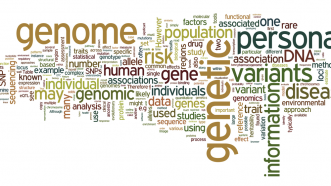After completing groundbreaking initiatives like the Human Genome Project more than a decade ago, the United States now finds itself playing catch-up with China in genomics research.
The United States is moving from being an undisputed leader to a potential laggard in genomics research—and biomedical R&D in general—the top official at the National Institutes of Health (NIH) warned recently.
During the 21st Century Cures Roundtable at the U.S. House of Representatives, Francis Collins, M.D., PhD, and NIH director, lamented the fact that since the completion of the Human Genome Project in 2003, the agency’s “purchasing power for biomedical research” has plummeted by 23%. In the meantime, other countries like China and England have ramped up their funding in the last decade to possibly overtake the U.S. in the next five years in genomics and other important areas of innovation.
Collins said,
“The United States led the Human Genome Project and from that derived great benefit—the return on that investment was 178 to one in terms of economic growth. Yet, if you ask me now where is the largest investment in genomics in the world, it is not in the United States. It is in Shenzhen, China. They read our playbook, and they saw what an opportunity was there. They took advantage of that.”
Shifting Priorities Impact Scientific Standing
That playbook was clearly successful for the U.S. Citing Battelle’s The Impact of Genomics on the U.S. Economy, Collins told a Senate panel earlier this year that the initial $3.8 billion in funding for the Human Genome Project (HGP), plus the extra $8.5 billion spent for genomics-related research, resulted in nearly $1 trillion worth of economic growth and added 4.3 million job-years of employment from 1988-2012.
But since 2012, funding for biomedical research has dropped 20 percent. Those R&D jobs are also evaporating in the face of funding cuts. Collins referred to a 2013 survey of scientists and researchers across the U.S. which said that about half of 3,700 scientists were either being laid off or being turned away for lack of funding.
“What keeps me awake at night is the impact of these financial strains on our most critical resource—the talented scientists in our nation’s finest universities who have been the source of phenomenal innovative breakthroughs over the decades, making America the envy of the whole world,” Collins told the Senate panel.
Collins’ colleague Eric Green, director of the National Human Genome Research Institute, had a similar message at a roundtable meeting in early September. Noting China’s rise in genomics research, Green said,
“We developed the playbook, and we are letting other countries now run with it. I celebrate what other countries are doing to contribute to biomedical research, but why would we, the United States—with all of the talent and creativity and vision here—decide to exit the stage just when it was getting interesting. We clearly have a critical role to play here.”
Chinese Genomics Success Based on U.S. Technologies
Both Collins and Green noted that China’s rapid ascent in genomics research was largely dependent on technologies that the U.S. pioneered and developed over the past decade.
In particular, Chinese company BGI—which was founded by U.S.-trained Chinese researchers—now holds the distinction of having the world’s biggest capacity for human genome sequencing, according to Forbes.
After buying Complete Genomics of California, and powerful 128 HiSeq 2000 gene-sequencing machines, BGI can now sequence 80% of all human genomes the world has processed, said Harvard University genetics professor George Church.
According to the Forbes report, BGI has at least “25% of the world’s total in gene-sequencing services.” U.S.-based Illumina of San Diego and the Broad Institute of Harvard and MIT are lagging behind BGI. Google-backed 23andMe of California is also a notable player in personal genomics.
Chinese R&D Spending Outstrips U.S. Funding
In contrast to the anemic funding efforts by the U.S., China has already spent more than $100 billion in R&D areas—including genomics—in the past ten years alone, former U.S. Vice President Al Gore told Eric J. Topol, M.D. in an interview earlier this year.
“They have identified this effort as one of the pillars of their new economic blueprint. They're seemingly determined to spend unlimited sums of money. They've attracted in the past 3 years 80,000 Chinese-born Western-educated PhDs in these fields to come back to China,” Gore said. On the other hand, he added, “we see billions cut that should be spent on R&D and basic science opportunities in these incredibly exciting fields that can revolutionize healthcare and improve the quality of life for Americans.”
Genomics and the Future of Medicine
Personal genomics is seen as one of the most important areas in the future of medicine. With sequencing, researchers can pinpoint the genetic variations that are responsible for a myriad of diseases, and tailor therapies based on the genetic blueprint of the individual.
The commitment to genomics and biomedical R&D in the U.S. is apparently being challenged. American scientists—pioneers in genomics—are rightly warning against complacency during this critical juncture of genomics research when discoveries are about to explode and boundless opportunities lie ahead.
As Dr. Topol said during last year’s Future of Genomic Medicine conference,
“The future of medicine is the future of genomics; they're tied together. It's about digital medicine; it's about being very precise with respect to diagnosis, therapy, and, for the first time, prevention. Knowing so much, like a Google map of each human being, and genomics being a big part of it, sets us up for a whole new opportunity as compared to the waste, mistakes, and issues that we have to confront in medicine today.”
Log in or register for FREE for full access to ALL site features
As a member of the nuviun community, you can benefit from:
- 24/7 unlimited access to the content library
- Full access to the company and people directories
- Unlimited discussion and commenting privileges
- Your own searchable professional profile







.jpg)
